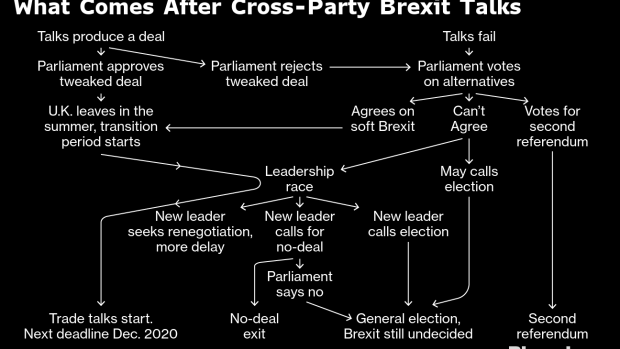May 15, 2019
Advice From Fund Managers? Sell the Pound
, Bloomberg News

(Bloomberg) -- Sell the pound, avoid U.K. gilts and wait for Brexit progress.
That’s the advice from fund managers and strategists opting to reduce exposure to the U.K. amid a lack of Brexit clarity and escalating trade tensions. BlueBay Asset Management LLP is shorting the pound and gilts, while UBS Wealth Management is avoiding U.K. government debt and long-term pound bull Nomura International Plc has ended its buy recommendation on sterling.
The pound is the worst performer among Group-of-10 currencies in the past week, with Brexit talks between the Conservatives and opposition Labour dragging on and no sign of progress. Prime Minister Theresa May is under pressure from her own side to abandon the process and step down, a move that could open up the prospect of an election to break the deadlock.
“I don’t see talks between Labour and Tories going anywhere,” said BlueBay chief investment officer Mark Dowding. “Ultimately Theresa May is gone and a more hardline Brexiteer will replace her. This suggests higher risks of a hard Brexit in November.”
Options traders have increased bearish bets on the pound this week, while asset managers remain short and leveraged funds have cut their net long position to the lowest since March, according to the latest data from the Commodity Futures Trading Commission. The currency has fallen for the past two months after a strong start to the year that turned it into the best performer among peers.
The market is still too complacent on the political situation, according to Dowding. Nigel Farage’s Brexit Party has exploited the divisions in the main two parties and is leading polls for next week’s European Union parliamentary elections by calling for a quick exit from the bloc without a deal.
“Either ‘no deal’ or ‘no Brexit’ now seem more likely than a negotiated settlement on a Brexit deal,” said Dowding. Having flitted in and out of negative positions on the pound and U.K. government bonds in the past two years, Dowding now sees “there is asymmetric risk for both to weaken.”
U.K. government bonds have rallied so far this year amid the Brexit uncertainty but fund managers worry they could just as easily go the other way if a soft Brexit lifts the prospect of policy tightening or if a severe no-deal exit ushers in credit risks.
There are better choices than gilts available for investors looking for risk-off assets who can currency hedge, such as Treasuries given there is scope for U.S. interest-rate cuts, said Gary Kirk, founding partner at TwentyFour Asset Management.
The Bank of England has been hamstrung by Brexit and its next policy step is impossible to predict, according to Maximilian Kunkel, Chief Investment Officer for Germany at UBS Wealth Management, which managed $2.26 trillion as of December 2018.
“We don’t think it makes any sense at the moment to trade in U.K. government debt,” said Kunkel. “We have become relatively cautious on the U.K. in any case, given no matter what Brexit you’re going to get, in the end the U.K. economy is likely going to suffer from it.”
--With assistance from Stephen Spratt.
To contact the reporters on this story: Charlotte Ryan in London at cryan147@bloomberg.net;Anooja Debnath in London at adebnath@bloomberg.net
To contact the editors responsible for this story: Ven Ram at vram1@bloomberg.net, Neil Chatterjee
©2019 Bloomberg L.P.


